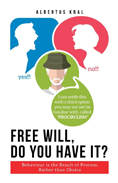
 |
Free Will, Do You Have It? Behaviour is the Result of Process, Rather than Choice (3rd Edition)
by Albertus Kral
Tellwell Talent
One of the most foundational and intriguing concepts of philosophy is that of free will. Does it exist, and what does it mean to either have or lack it in the face of tragedy, success, or any mixture of the two? The concept of free will is popular because it is self-deterministic, appealing to both secular and religious thinkers for its themes of empowerment and explanation for the maladies and majesty of human accomplishment. But what if it is actually an illusion? What if free will isn’t quite as cut-and-dried a concept as we make it out to be, as a thing to be either had or devoid of? In this book, the author promotes his concept of procirclism, which indicates that everything from our reflexive automated behaviors down to making (or not making) a choice on a matter is the result of a biological and learned process rather than a conscious choice.
Procirclism is a combination of the words process, circle, and, of course, the suffix to identify it as a philosophy. What it indicates is that how a person reacts to a stimulus or arrives at a conclusion is a combination of biological and mental awareness. That same reaction informs future encounters with even slightly similar situations. With this understanding, one can clearly see how a person’s behavioral patterns are not because they choose to be aggressive, afraid, passive, or bold but that their reaction is trained without them quite ever really realizing it. Forging new theoretical ground with this concept, this book explains the fundamentals of procirclism, how it helps to explain choices and behaviors that societally may seem completely unreasonable, and what it means for our perception of the self and our understanding of our own existences.
From the very first pages and even the title of this book, the question being posed and the concept being examined are so intrinsic to how we understand ourselves and our ability to function that it stirs curiosity in the reader to learn more. Much like the author’s admission that the very same question being asked of him led him down a long, arduous deconstruction of his own thinking to arrive at this point, readers are only asked to keep an open mind as the same train of thought is presented to them. The journey of how to reconcile a new idea with what has always felt like a simple yes-or-no question is a personal one, but it is shared, and now the author is effectively piloting the ship safely for everyone else.
There are many mysteries and ponderings in our lives, great questions that we may never know definitively one way or the other, and it is the role of philosophers like Kral not to offer proof but rather critical thinking and a compelling argument for a different way of thinking. This, in essence, is what the author does extremely well. Whether or not the concept of procirclism outlined in this book will be agreeable to each person who reads it is not really a binary outcome, but if it helps to provide some level of comfort, reflection, and introspection that eases a person’s mind or bolsters them to the path they want to be on, then it has done its important work as an intellectual text. The careful dissection of hypothetical situations and the direct and easy-to-digest approach of Kral’s writing make this a book that can absolutely scratch the mental itch of anyone curious enough to pick it up and process it.